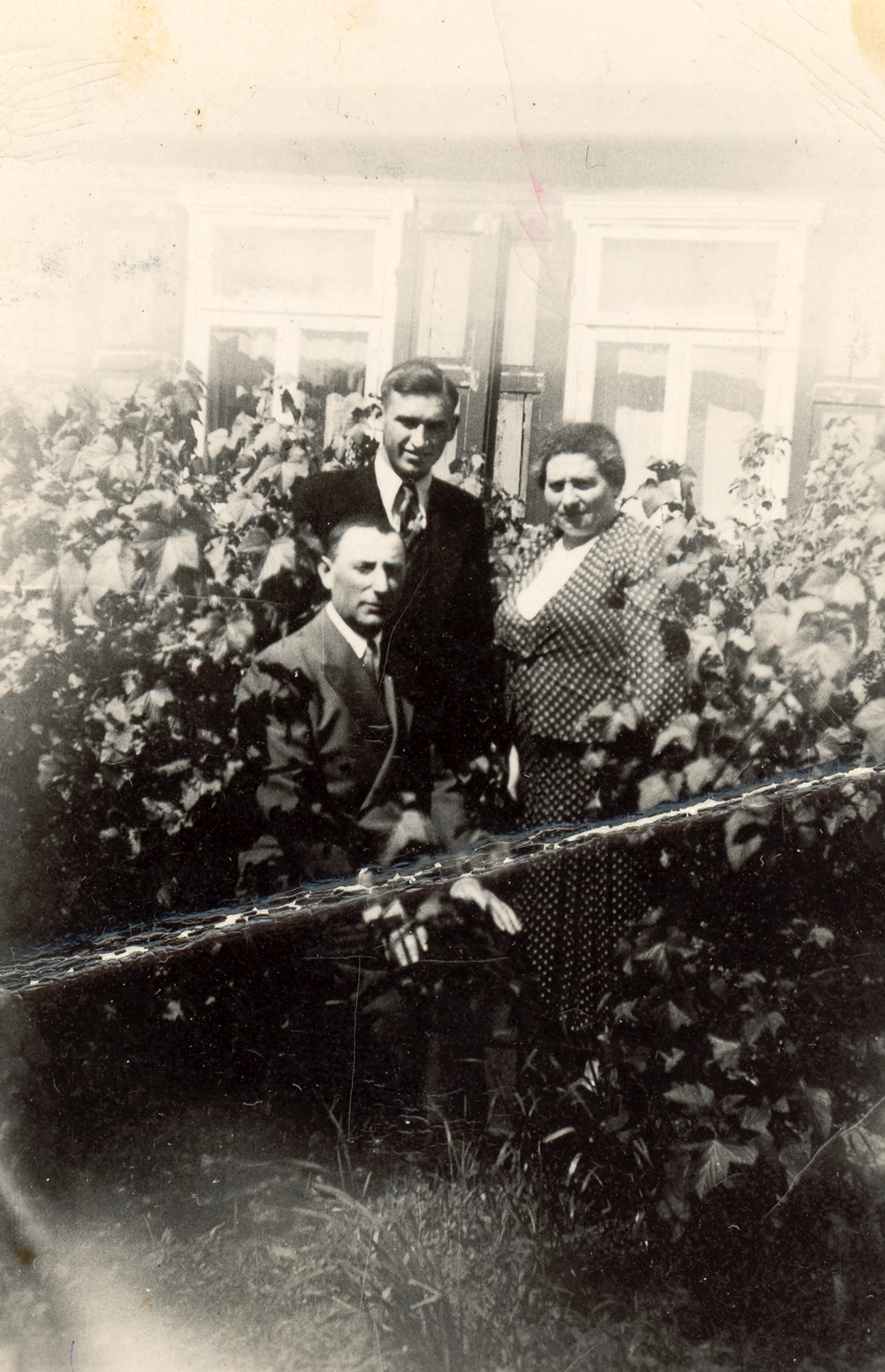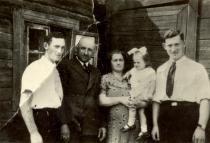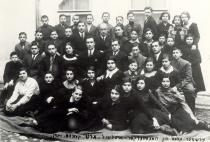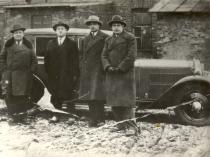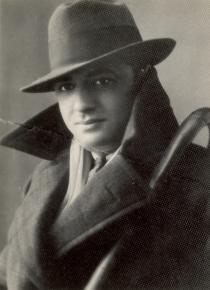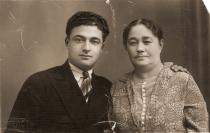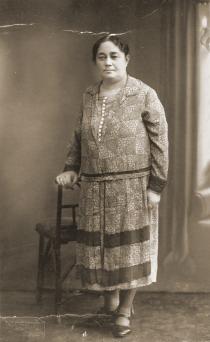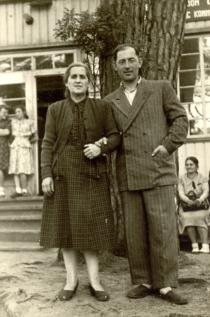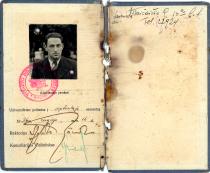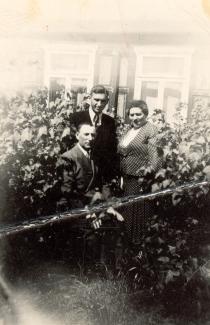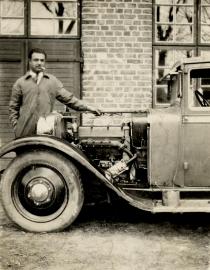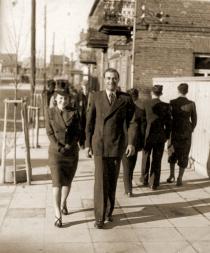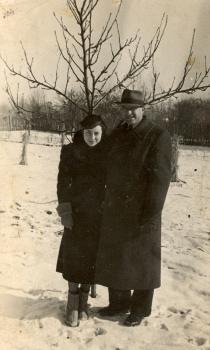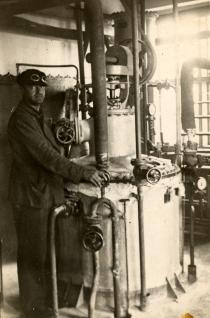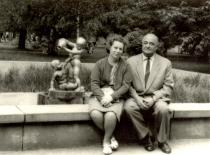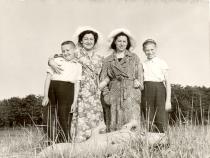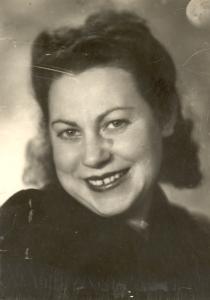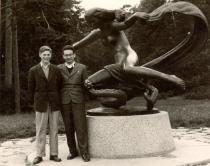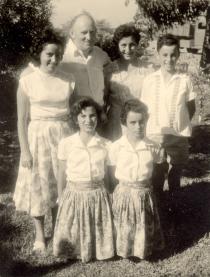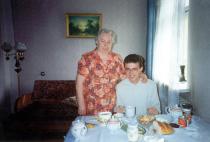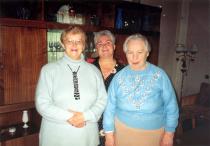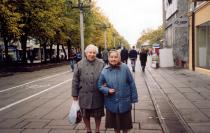My parents Sheina and Morduchai Ragozhik are standing near our house in Vilkaviskis. Our lodger, the Catholic priest Stasis is sitting. I was told he helped rescuing Jews during the war. Now he lives in Vilnius. He is about one hundred years old. The picture was taken in the early 1930s.
Our family lived in a big house, inherited by my mother. The whole family lived in that house, while my maternal grandfather was alive. It was a large two-storied house, located in the central part of the town, on Vilniaus Street. There was a plot of land of two hectares around the house. It was the most precious property we had. My father was a natural born gardener. I don’t know who imbued him with the love for trees, where he learnt that art. At any rate, the garden was amazing. Fruit trees were planted there. There were all kinds of wonderful sorts of apple, pear, plum, cherry, sweet-cherry trees. Apart from that, there were wonderful corners of the garden with decorative plants and flowers. There was a pond, where Father bred carps and other fish. There was an arbor on the bank of the pond. We often went there in the evenings to have heart-to-heart conversations. The orchard was created by my father. I’m still wondering, how he could manage to work at the factory and take care of the garden. Especially in spring and fall, when there was a lot of work in the garden. We had to sprinkle the plants, cut the crowns of the trees, fight with the plant pests, bugs, gather harvest, put it in storage or in the basement.
Father hired farm hands: Lithuanians, who worked under his supervision. These were common Lithuanian boys and girls. They respected my parents and treated them kindly. He deserved it since he was very honest, valued other people’s work, and Mother always tried to provide hearty meals for the employees. Lithuanians called my mother Sheina. I was affectionately called Rachelka. The orchard was so beautiful that it was famous beyond our town. People from other cities of Lithuania came to see our orchard. Father was especially happy on those days as his labor and merits were recognized. He gladly shared his experience with the visitors and Mother fed the guests right away, which was common in Jewish families.
There was a garden apart from the orchard. Almost all vegetables were planted there: potatoes, beets, carrots, cabbage of different sorts, all kinds of herbs and spices. There was a chicken coop at the back of the yard. We always had chicken and turkeys. There was a time when Mother kept a cow. Then it was sold, as there was nobody to herd it. We also had a dog. We, the children, adored it. The dog had its own kennel, but Father was so kind that he let the dog out and we ran around with it in the garden.
I loved our house very much and remember every corner of it. There were four large rooms and a kitchen. It had a layout typical for Lithuania: one after another along the façade of the house. The largest room was the drawing room, which was used as a dining room at the same time. There were a large carved cupboard, dining table with chairs and a large mirror, reaching from the floor to the ceiling. A radio appeared in the same room in the 1930s. The second room was a bedroom. There were two wooden beds, a wardrobe with lots of drawers. The other two rooms were used as bedrooms for my brothers and me. Later on, when my brothers finished school and left the town, Mother started leasing their room. A young Lithuanian, Stasis, occupied their room. He studied at the seminary in Vilkaviskis. He became a priest after finishing it, but still he kept living in our house. He loved my parents very much and loved me as a sister. He was a truly religious Catholic, but it didn’t stop him from living in a Jewish house and loving its inhabitants.
